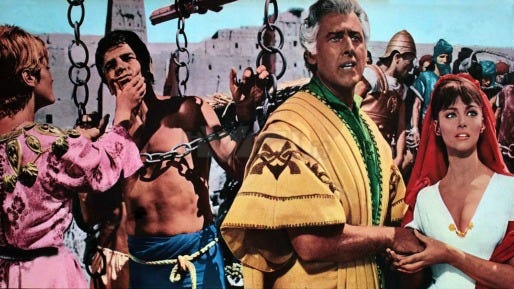The Last Days of Sodom and Gomorrah (1962)

"The Last Days of Sodom and Gomorrah" is a classic example of mid-century ersatz Hollywood cheese, a cynical attempt to rip off a spectacularly successful film on the cheap.
Stewart Granger plays Lot from the famous biblical tale of "Sodom and Gomorrah" (as this film was known everywhere else in the world but America). He's got the same poofy white-and-grey pompadour that Charlton Heston wore in "The Ten Commandments," though sans beard. Ostensibly this is because Lot is in mourning after the death of his wife, but he remarries midway through and the chin whiskers never appear. I think the filmmakers just didn't want to hide Granger's famous jutting chin.
The movie was a French/Italian/American production financed by the likes of Joseph E. Levine, famous for bringing cut-rate Hercules and Japanese monster flicks to these shores and promoting the hell out of them. (He also financed prestige projects like "A Bridge Too Far.") He and his fellows did a fair job on this film, making it a modest international hit without any of the sumptuous production values of "Commandments."
It was directed by Robert Aldrich, who had a fine career with the likes of "What Ever Happened to Baby Jane?", "The Dirty Dozen," "The Flight of the Phoenix" and "The Longest Yard." Screenwriters Giorgio Prosperi and Hugo Butler loosely based the script on the book by Richard Wormser, taking great liberties with biblical texts to flesh out Lot's story into a 2½ hour movie.
As I remember from interminable Sunday school classes, the basic tale of Lot is one of loss and redemption, and more loss. Lot leads his portion of the Hebrew tribe out of the desert to the edge of the twin cities of Sodom and Gomorrah, famous for their salt mining and lecherous ways. After initially keeping the Jews upright in their faith as farmers, Lot eventually succumbs to power and vanity, as they move into Sodom and become corrupted.
But then the angels of God warn him of the city's destruction, and he pleads to let the city be spared if he can find 50 men of good will in Sodom — which he then haggles down to 10. Strangely, in the movie he never actually seems to go looking for the 10 good men, and the Lord's wrath is unleashed in the form of a storm that looks eerily like an atomic bomb explosion. Despite the warning of the angels, Lot's wife looks back on the city's destruction and, seeing the power of God unveiled, is turned into a pillar of salt.
The film adds a whole bunch of new characters and subplots from Wormer's book, while leaving out chunks of biblical text. For instance, the fall of Sodom and Gomorrah and Lot's capture by the Elamite leader Chedorlaome, and subsequent rescue at the hands of Abraham, is omitted.
And, needless to say for a film released in 1962, Lot's subsequent incest with both of his daughters is left out. Though there is a fair amount of flesh for a movie of this era, including a languid tracking shot across a bunch of sleeping revelers, who are clearly implied to have just held an orgy.
"The Last Days of Sodom and Gomorrah" also shows Lot leaving Sodom not only with his family, but the entire Hebrew tribe. This is obviously an attempt to replicate the exodus scenes of Moses from "The Ten Commandments." (Don't forget, back then extras were cheaper and more effective than special effects.)
Anouk Aimée plays the exotic heavy, aka Yul Brynner's counterpart in this movie. As Queen Bera, she rules with a benevolent but depraved hand, encouraging her people to engage in all sorts of debaucherous pleasures. Her brother, Astaroth (Stanley Baker), longs to overthrow her, and isn't particularly subtle about it. He secretly arranges a compact with the Elamites to attack the Hebrews and Sodom.
Astaroth spars with Lot from the get-go, and have a couple of duels in which the much older Lot easily bests him, despite using only a shepherd's crook as a weapon. The prince manages to deflower both of Lot's daughters (off-camera), Shuah (Rossana Podesta) and Maleb (Claudia Mori). As is typical for this type of movie, the children become resentful of their father and enamored with the glamorous ways of their adopted homeland.
Lot's primary relationship is with Ildith (Pier Angeli), a Sodomite slave and chief of Queen Bera's household retinue. She is given to Lot as a peace offering during their negotiations — Bera agrees to allow the Hebrews to occupy the land across the River Jordan in exchange for a share of their crops. Ildith, used to the soft ways of the city, is mightily put out but eventually becomes Lot's second wife.
There's really not much to recommend about "The Last Days of Sodom and Gomorrah." A couple of the battle scenes are fitfully entertaining, and Granger has screen presence as the stiff-but-honorable Lot. Most of the people involved with the production apparently considered it the low point of their creative careers, and I don't find much reason to disagree with them.
2 Yaps



